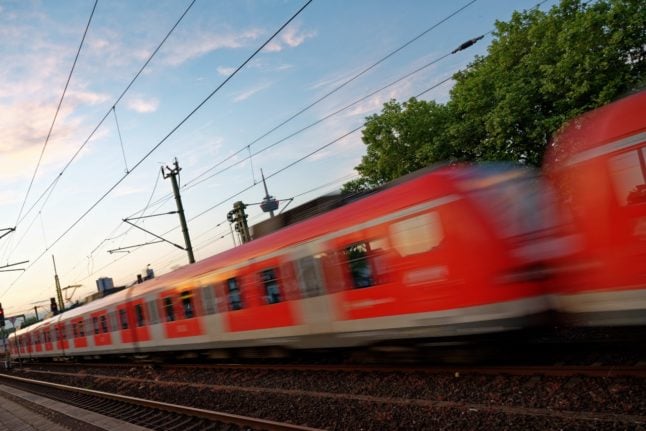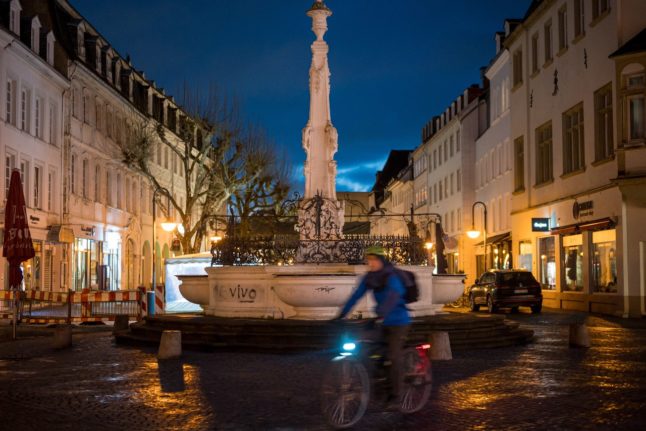Everything that changes in Germany in April 2023

From the €49 ticket pre-sale to higher tax allowances for employees and single parents, here's everything that's set to change in Germany in the coming month.
End of the (last few) Covid rules
"Rules - what rules?" is likely to be the question on everybody's lips when the Infection Protection Act quietly expires on April 7th - and it's true that, unless you work in a clinic or care home, the end of this bill probably won't change much in your day-to-day life. With the end of masks on public transport in large swathes of Germany back in February, Germany toppled one of the last few Covid rules it had - and since then people have generally only needed an FFP2 mask for the odd doctor visit.
That said, the end of the bill is pretty significant in another way. It signals the end of a three-year pandemic that shook the world and the official recognition that a virus that was once so deadly has now become endemic. Just like the winter flu and common cold, Covid is here to stay, but nobody will be feeling too sentimental about leaving the days of lockdowns, tests, and vaccine passes behind us.
No more sick notes by telephone
On March 31st, special regulations allowing people to get a sick note from their doctor over the phone will expire. This was initially intended to avoid unnecessary Covid infections but, given the much less risky situation at present, officials don't think there's a need for it anymore.
However, there could still be a way to avoid lengthy stays in the doctor's waiting room in future. If your GP offers the service, you can always get your sick note (or Krankschreibung) after a video appointment instead - provided your illness doesn't require a physical inspection.
Higher tax allowances
In the days of grim financial news, there's a bit of light on the horizon for taxpayers as higher tax-free allowances for both employees and single parents will apply from April.
Starting next month, the so-called Arbeitnehmerpauschale (employee lump sum) will be hiked up to €1,230 per year. This is the amount of expenses the tax office assumes you'll have in relation to your work and deducts from your taxable salary (without needing proof) each year.
The tax-free allowance for single parents will also be increased to at least €4,260 (plus €240 for additional children), meaning single mums and dads get to keep a little bit more of their salaries.
If you're feeling a slight sense of deja vu, it may be because both of these tax-free amounts actually went up at the start of this year, but April marks the first month they will be factored into your payslips. So if you see a little bit extra in your bank account next month, that could be why.
READ ALSO:
- EXPLAINED: The German tax changes coming into effect in April 2023
- EXPLAINED: Which German benefits are increasing in 2023 - and how do I claim them?
Deutschlandticket goes on sale
It was meant to be hitting the ticket offices back in January, but as the saying goes: better late than never.
From April 3rd, the official pre-sale of the €49 ticket will kick off, allowing early birds to set up their Abo via Deutsche Bahn ahead of the launch of the ticket in May.
Of course, some states have been much quicker off the mark than Germany's rail operator, so if you live in Frankfurt or Berlin, for instance, you may have already got your subscription sorted.
It's worth noting that some states are working on further concessions for students or pensioners, while some people may be able to get the ticket cheaper via their work, so be sure to check with your employer first to see if you're entitled to a 'Jobticket'.
READ ALSO: State by state: Who will get a discount on Germany's €49 transport ticket?
?
An S-Bahn train in Cologne. Photo: picture alliance/dpa | Henning Kaiser
Microsoft hikes its prices
First it was gas, then it was groceries, then it was beer - and now even software products are going up in price.
Starting in April, tech giant Microsoft has announced price rises across its cloud products, which include Microsoft 365, Office 365 and Dynamics 365 as well as Microsoft Defender and Teams. The price hikes will depend on the product, but some customers could see their subscription go up by as much as 20 percent.
To justify the move, the company pointed to changes in the value of global currencies and said it wanted to make its pricing more consistent for customers around the world. This is also something they'll look at twice a year going forward - so brace yourself for even more price hikes six months down the line.
Gay men are allowed to give blood
A rule that banned homosexual men from donating blood will be scrapped in April. From then on, anyone will be allowed to give blood regardless of their gender or sexual orientation, or whether they are cis or trans.
What will continue to remain the case is that people who regularly change their sexual partner - or have multiple sexual partners - will not be permitted to give blood. This is determined via a questionnaire that potential donors fill out beforehand.
Painters, builders and agency workers get a pay rise
Life is getting more expensive in Germany, but some workers are also set to get a healthy boost to their wage packets from April.
Under a collective agreement that was signed back in January, painters and varnishers got their basic hourly wage hiked to €18.39 in the western states and Berlin and €17.86 in the eastern states.
Workers a little lower down the pecking order are now due a pay rise as well, as the industry-specific minimum wage for helpers will rise to €12.50 per hour and the second minimum wage will increase to €14.50.

A painter and decorator at work. Low-paid workers in this sector are set to get a pay rise in April. Photo: picture alliance/dpa/dpa-tmn | Kirsten Neumann
As well as painters and varnishers, construction workers can also look forward to more money from April 1st. Wages in western Germany will be increased by two percent and in eastern Germany by 2.7 percent, and workers will be given a bonus of €1,000 to compensate for inflation.
The collective agreement also stipulates that workers will receive compensation for travelling to construction sites. These are paid as lump sums and are based on the number of kilometres.
Temp or agency workers will also be taking home a little bit extra next month as the minimum wage in their sector increases to €13 per hour.
New questions on driving tests
Thinking of biting the bullet and getting a German driving licence? Then make sure you have an up-to-date practice test, as 44 new questions are set to be added to the theory test from April.
Of these new questions, 23 will only apply to Class B licences - the type that most drivers need in order to get behind the wheel.
If you're using one of the popular apps to prepare for your test, you'll need to ensure this is fully up to date by the time you sit down for the exam.
READ ALSO: How to get a German driver's licence as a third-country national
Lights go back on in towns and cities
The clocks are going forward this week, and the evenings are set to get lighter in more ways than one. As well as a precious extra hour of sunshine late in the day, towns and cities will once again be permitted to illuminate their statues, fountains, building sites and public buildings at night.

A cyclist rides past the fountain on St. Johanner Markt in Saarbrücken. Photo: picture alliance/dpa | Oliver Dietze
That's because the emergency energy saving measures introduced last September are due to expire on April 15th - provided they're not extended. This legislation was initially brought in following Russia's invasion of Ukraine at a time when Germany was struggling to reduce its energy usage and its dependence on Russian gas. But with winter behind us and the gas storage facilities still relatively full, this summer will likely see a much more relaxed approach to energy usage.
READ ALSO: What to know about Germany's energy saving rules
Nuclear power plants to close
Just as Germany looks set to loosen up its energy-saving rules, the country's three remaining nuclear power plants - will be powered down for (potentially) the last time.
As part of the government's transition away from nuclear power and coal, these three plants - Isar 2, Neckarwestheim 2 and Emsland - were originally set to be shut down at the end of 2022. However, due the war in Ukraine and the ensuing energy crisis, the government kept them in operation - but the Federal Office for Nuclear Waste has announced that these will close in the middle of April.
Comments
See Also
End of the (last few) Covid rules
"Rules - what rules?" is likely to be the question on everybody's lips when the Infection Protection Act quietly expires on April 7th - and it's true that, unless you work in a clinic or care home, the end of this bill probably won't change much in your day-to-day life. With the end of masks on public transport in large swathes of Germany back in February, Germany toppled one of the last few Covid rules it had - and since then people have generally only needed an FFP2 mask for the odd doctor visit.
That said, the end of the bill is pretty significant in another way. It signals the end of a three-year pandemic that shook the world and the official recognition that a virus that was once so deadly has now become endemic. Just like the winter flu and common cold, Covid is here to stay, but nobody will be feeling too sentimental about leaving the days of lockdowns, tests, and vaccine passes behind us.
No more sick notes by telephone
On March 31st, special regulations allowing people to get a sick note from their doctor over the phone will expire. This was initially intended to avoid unnecessary Covid infections but, given the much less risky situation at present, officials don't think there's a need for it anymore.
However, there could still be a way to avoid lengthy stays in the doctor's waiting room in future. If your GP offers the service, you can always get your sick note (or Krankschreibung) after a video appointment instead - provided your illness doesn't require a physical inspection.
Higher tax allowances
In the days of grim financial news, there's a bit of light on the horizon for taxpayers as higher tax-free allowances for both employees and single parents will apply from April.
Starting next month, the so-called Arbeitnehmerpauschale (employee lump sum) will be hiked up to €1,230 per year. This is the amount of expenses the tax office assumes you'll have in relation to your work and deducts from your taxable salary (without needing proof) each year.
The tax-free allowance for single parents will also be increased to at least €4,260 (plus €240 for additional children), meaning single mums and dads get to keep a little bit more of their salaries.
If you're feeling a slight sense of deja vu, it may be because both of these tax-free amounts actually went up at the start of this year, but April marks the first month they will be factored into your payslips. So if you see a little bit extra in your bank account next month, that could be why.
READ ALSO:
- EXPLAINED: The German tax changes coming into effect in April 2023
- EXPLAINED: Which German benefits are increasing in 2023 - and how do I claim them?
Deutschlandticket goes on sale
It was meant to be hitting the ticket offices back in January, but as the saying goes: better late than never.
From April 3rd, the official pre-sale of the €49 ticket will kick off, allowing early birds to set up their Abo via Deutsche Bahn ahead of the launch of the ticket in May.
Of course, some states have been much quicker off the mark than Germany's rail operator, so if you live in Frankfurt or Berlin, for instance, you may have already got your subscription sorted.
It's worth noting that some states are working on further concessions for students or pensioners, while some people may be able to get the ticket cheaper via their work, so be sure to check with your employer first to see if you're entitled to a 'Jobticket'.
READ ALSO: State by state: Who will get a discount on Germany's €49 transport ticket?
?
Microsoft hikes its prices
First it was gas, then it was groceries, then it was beer - and now even software products are going up in price.
Starting in April, tech giant Microsoft has announced price rises across its cloud products, which include Microsoft 365, Office 365 and Dynamics 365 as well as Microsoft Defender and Teams. The price hikes will depend on the product, but some customers could see their subscription go up by as much as 20 percent.
To justify the move, the company pointed to changes in the value of global currencies and said it wanted to make its pricing more consistent for customers around the world. This is also something they'll look at twice a year going forward - so brace yourself for even more price hikes six months down the line.
Gay men are allowed to give blood
A rule that banned homosexual men from donating blood will be scrapped in April. From then on, anyone will be allowed to give blood regardless of their gender or sexual orientation, or whether they are cis or trans.
What will continue to remain the case is that people who regularly change their sexual partner - or have multiple sexual partners - will not be permitted to give blood. This is determined via a questionnaire that potential donors fill out beforehand.
Painters, builders and agency workers get a pay rise
Life is getting more expensive in Germany, but some workers are also set to get a healthy boost to their wage packets from April.
Under a collective agreement that was signed back in January, painters and varnishers got their basic hourly wage hiked to €18.39 in the western states and Berlin and €17.86 in the eastern states.
Workers a little lower down the pecking order are now due a pay rise as well, as the industry-specific minimum wage for helpers will rise to €12.50 per hour and the second minimum wage will increase to €14.50.

As well as painters and varnishers, construction workers can also look forward to more money from April 1st. Wages in western Germany will be increased by two percent and in eastern Germany by 2.7 percent, and workers will be given a bonus of €1,000 to compensate for inflation.
The collective agreement also stipulates that workers will receive compensation for travelling to construction sites. These are paid as lump sums and are based on the number of kilometres.
Temp or agency workers will also be taking home a little bit extra next month as the minimum wage in their sector increases to €13 per hour.
New questions on driving tests
Thinking of biting the bullet and getting a German driving licence? Then make sure you have an up-to-date practice test, as 44 new questions are set to be added to the theory test from April.
Of these new questions, 23 will only apply to Class B licences - the type that most drivers need in order to get behind the wheel.
If you're using one of the popular apps to prepare for your test, you'll need to ensure this is fully up to date by the time you sit down for the exam.
READ ALSO: How to get a German driver's licence as a third-country national
Lights go back on in towns and cities
The clocks are going forward this week, and the evenings are set to get lighter in more ways than one. As well as a precious extra hour of sunshine late in the day, towns and cities will once again be permitted to illuminate their statues, fountains, building sites and public buildings at night.

That's because the emergency energy saving measures introduced last September are due to expire on April 15th - provided they're not extended. This legislation was initially brought in following Russia's invasion of Ukraine at a time when Germany was struggling to reduce its energy usage and its dependence on Russian gas. But with winter behind us and the gas storage facilities still relatively full, this summer will likely see a much more relaxed approach to energy usage.
READ ALSO: What to know about Germany's energy saving rules
Nuclear power plants to close
Just as Germany looks set to loosen up its energy-saving rules, the country's three remaining nuclear power plants - will be powered down for (potentially) the last time.
As part of the government's transition away from nuclear power and coal, these three plants - Isar 2, Neckarwestheim 2 and Emsland - were originally set to be shut down at the end of 2022. However, due the war in Ukraine and the ensuing energy crisis, the government kept them in operation - but the Federal Office for Nuclear Waste has announced that these will close in the middle of April.
Join the conversation in our comments section below. Share your own views and experience and if you have a question or suggestion for our journalists then email us at [email protected].
Please keep comments civil, constructive and on topic – and make sure to read our terms of use before getting involved.
Please log in here to leave a comment.